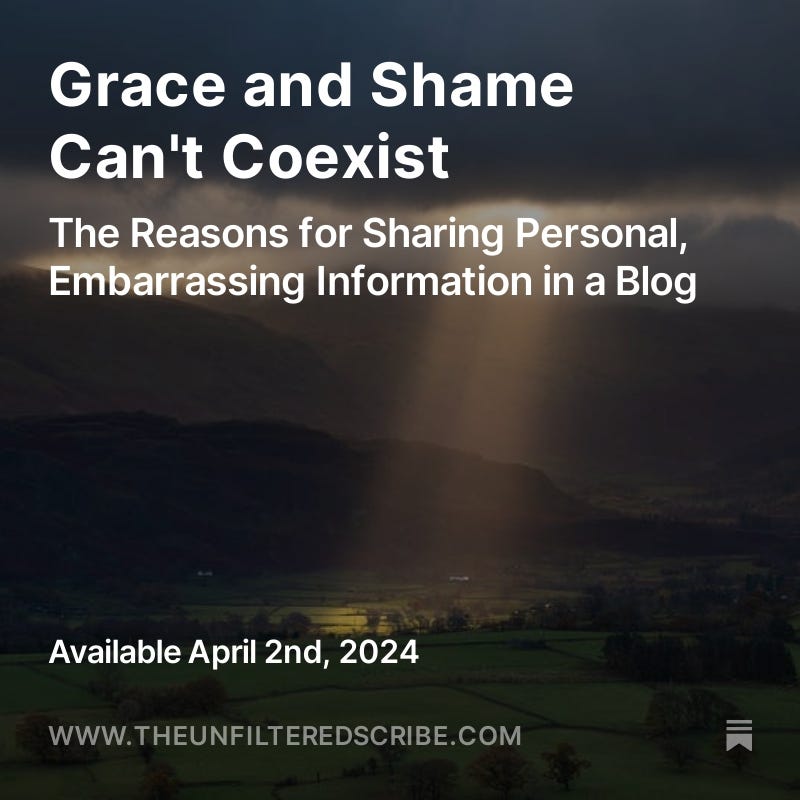What's In a Name?
When Is It Time to Change Your Substack Name?
Sometimes, we just need a guide.
This is true for me in a number of ways, and it’s certainly true when it comes to understanding how to have a successful experience on Substack. So, I went looking for someone to help me understand the inner workings of this platform. I was looking for someone who both understood quality writing and how to get the most out of Substack.
I found Sarah Fay | Writers at Work. There are others, I’m sure. But I decided on Sarah due to her own success here and her credentials as a writer. There are a lot of people who will tell you they are good writers and you should pay them to tell you how to be successful like them. I didn’t need that. I needed someone who have had other people testify to their ability. This is Sarah. I decided she was the one I’d trust to guide me during the early part of my Substack journey. I sent her a bit of my hard-earned money for some one-on-one coaching, and I’m glad I did.
I would describe our first conversation as being a time to re-focus. I needed this. It helped me to remember why I started my Substack in the first place, what it had evolved into, and what I wanted it to be moving forward. Then we discussed things that needed adjustment. We went over several items, but as we talked it became clear to me that my About page was somewhat upside-down and… off-kilter, I suppose. Professor Fay gave me some homework: Re-work my About page.
Then she said something I saw coming, but hoped wouldn’t come up. It was a hard truth.
“You need to consider changing your Substack name.”
I grimaced. Then I asked her a question for which I already knew the answer. “Why?”
“It’s too poetic.” She answered as I nodded with my eyes closed.
It is a best practice to create a title which will immediately convey the content of your writing.
I’m considering that Sarah might be right. The Unfiltered Scribe is great. I’m unfiltered, and I write about religious-y stuff, kind of like an old scribe. But readers need to do a bit of brain-work to figure that out, and I’m not sure the name points to what I write about. In this chapter of my life, I’ve discovered I’m writing a great deal about human sexuality, how my evangelical upbringing formed my understanding of it, and how I’m learning to understand human sexuality and my faith differently.
So, I’m considering a name change. This isn’t a little thing. I want to get it right. So, today, I put it to you: What should I call this Substack moving forward?1
I have written a new draft for my about page, which is right below. Take a look, and give me your suggestions!
The About Page: A Draft
I created _________________ for people who were deeply committed to evangelical beliefs or practices but have undergone a significant change in their relationship with the evangelical church.
Finding the right words to express just how this plays out is difficult, likely because the experience is different for each of us. Nonetheless, if you understood immediately what I meant with the opening line above, then I created this Substack for you. Further, even if you’re not associated with evangelicalism, but have had a similar experience in your relationship to your own faith, it’s likely you’ll find much in common with what you read here.
Some context…
I write from a perspective of a heterosexual man. This matters. My entire life has been in this context and I’m trying to do it – life as a man – better. My writing is largely confessional, particularly in regards to human sexuality. It’s far past time for men to take accountability for our failures. To a large degree, this is what drives my writing.
I write about Human Sexuality
You will find I have a lot to say about human sexuality. Frankly, when it comes to men taking accountability for our actions, there is no better place to start. There are reasons as to why we’ve acted deplorably and we need to explore them, own them, fix them, and move forward acting in better ways.
To suggest the evangelical church’s influence on Purity Culture missed the mark when it taught us how to express our sexuality would be an understatement. I found it provided me with a weak understanding of sex and its relationship to intimacy. As such, my foundation for marriage was doomed from the start. I examined whether I had gotten married so I could have sex so my wife and I could absolve ourselves of guilt for past actions. I discovered I had some things to confess to my wife about how I’d treated her in this area. Here’s what happened as a result:
1) My marriage, on the brink of divorce, rebounded to a state of healthiness I didn’t know was a thing.
2) I got my pornography use under control.
Essential to the healing process was the desire to learn what influenced me to act in certain ways. This helped me not act in those ways moving forward. I’m still learning about these things and I share what I’ve learned here, sometimes in real time.
What I didn’t expect was that I’d come to a place where I discovered grace. It was the grace I think my church wanted me to experience, but had never truly expressed. It was the kind of grace that stamped out shame, some of which my church had caused. As it turns out, grace and shame are polar opposites; they cannot exist in the same space. This was a game changing realization.
Since a new understanding of human sexuality helped me find grace, I began to examine other parts of my faith traditions too, mainly as they related to church doctrine. I’ve found there to be many areas where I understand things differently now.
Am I an exvangelical?
I’ve had a hard time jumping in this way. The evangelical church wasn’t just part of my life. It was my life and it still occupies a lot of my brain-space. But these days my focus isn’t about church. Rather, it’s about life, which is how it was supposed to be anyway. Ultimately, the descriptor wasn’t important to me one way or the other.
I was raised in a loving home, by loving people, and in a loving community. Any trauma I experienced was not inflicted upon me by people who were conspicuously self-serving. They meant for good, even though in the long run I experienced some harm. They were raised in the same cultural milieu as me. And, having experienced grace myself, I extend it to them in hopes they find the same healing. I’ve been forgiven much. I will do the same.
I understand why people have shed the term evangelical in favor of exvangelical, or even shed Christian altogether. I simply have not. Much, if not most of the good in me is a result of the same evangelical community that loved me.
Who I am:
I’m a husband to Joy, and father to two kids who really aren’t “kids” anymore. One is in college and the other will be soon.
If you were to ask me where I grew up, I’d say “Boston.” The truth is, I lived in several different places in New England, all within an hour’s drive from Boston. I earned my undergraduate degree in psychology from Eastern Nazarene College in Quincy, Massachusetts. I earned a Master’s Degree in College Student Affairs at Azusa Pacific University. While I left the world of student affairs in 2006, I have worked on college campuses in a variety of capacities all my life.
I’m also the son, grandson, great-grandson (…it goes back a long way…), and brother of evangelical ministers. My evangelical roots go deep and church was always what I did.
Why subscribe for free:
You have read my writing and found some things that seemed familiar to your lived experience or of those around you. You are hopeful for more of the same writing and don’t want to miss it when it happens. Subscribing means you won’t. My articles will be sent directly to your email inbox.
Why become a Paid Subscriber:
You want to support independent writers. You want to hear the in-depth, personal stories I share only with my paid subscribers who have indicated their commitment to grace, introspection, and personal health and growth. Usually, my paid offerings are more polished, and part of longer projects I’m working on. A memoir, for instance.
Thank you for taking the time to read about my Substack, ________________. Join me as we learn to be better versions of ourselves.
So, there you have it. Today’s call-to-action isn’t run of the mill. I need your input. Let me know in the comments, through an instant message, or in whatever way you’re comfortable.
I have shared my quandary with other writers on Substack, with mixed results. There are some that don’t think I should change it.





A few years ago, I read a wonderful series of cozy mysteries. I looked for more by that author but couldn’t find any. Researching a bit, I found an author FB page where, in one post, she mentioned she was starting a new series and wanted readership input as to which pseudonym she should as for her author name this time. It turned out her publishers insisted that each series must have a different author’s name and none of them were her real name. My comment was “If your publishers really want to sell your books which your readers already obviously love (by sales records), they would put the same name on every series so they would be easy to locate.” Changing names should have purpose.
Changing your Substack name should have a real purpose. It should mean you gain readership, create a more immediate understanding, etc. but I personally would challenge the excuse the present name is “too poetic” because there is nothing wrong with poetry. We need more of it. Plus, will people wonder where you have gone, because they can no longer find your original name.
That being said, I grew up in the United Church of Canada. At that time it was a fairly staunch blend of its original Methodist, Congregational and Presbyterian churches. They frowned upon evangelical churches. But my father had a wonderful life mantra which was “We are all different, but we are all equal.” No matter where we travelled on our summer holidays, we always went to church on Sundays. Sometimes they were evangelical. But that didn’t matter, it was church.
Given my recent introduction to The Four Stages of Faith (McLaren), I think there is always room for evangelism as long as it allows for faith to truly grow as demonstrated in the stages as presented by McLaren. I don’t have an issue with your present name, but the Evolving Evangelical is intriguing. Because faith is always evolving, moving as we move through our lives. It’s when churches try to stifle growth (and many denominations do this) that faith wilts. If you feel changing the name has real purpose, then change it. But it has to have meaning for you.
The Evolving Evangelical (evolving means growing, shifting, advancing, becoming clearer, unfolding)
The Elaborate Evangelical (elaborate means complex, made or done with great care or detail, having many parts that are interrelated)
I love the challenge, and honor your asking readers the question. Hope this helps stimulate the answer that rings true to you.